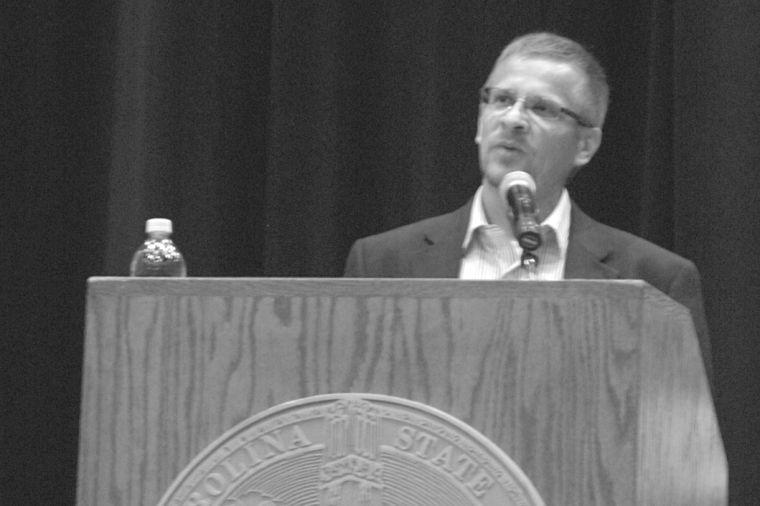Several students learned faith’s role in food production at InterVarsity Christian Fellowship’s “Faith, Food, and Farming” event Saturday morning.
InterVarsity chose the seminar to show how students can relate their Christian faith to areas of work in agriculture and horticulture. It also prompted students to take a deeper look at environmental topics that usually go unnoticed.
Dr. Norman Wirzba, a research professor of theology, ecology and rural life at Duke Divinity School, spoke to students and faculty about the relevance of these subjects in everyday life.
“People generally don’t think about the implications of Christianity in terms of farming and food,” Wirzba said. “When you look at the Bible, you’ll see that food and land are subjects found everywhere in scripture.”
After being introduced by a member of Veritas Forum, the non-profit ministry that joined InterVarsity to put on the event, Wirzba began to address the issues he touched on early in his speech. Speaking softly and enthusiastically, Wirzba engaged students by helping them understand what he deemed to be the importance of environmental respect and treating the world with Christian principles.
“The definition of food as found in scripture is God’s love made delectable,” Wirzba said. “How we name and narrate food is very important.”
Wirzba spent a good portion of his lecture discussing his concerns about the implications of adopting a consumer-based society. At one point, he compared our world today to a store where people take what they want whenever they please.
“We’re living in an unprecedented time in human history,” Wirzba said. “The language of natural resources never shows up in the Bible. Naming the world as creation is fundamentally different from referring to it as nature.”
Wirzba stressed the importance of developing a genuine respect for the world around us, ensuring that what we eat has been treated with respect. According to Wirzba, human nature causes us to act violently when things don’t go our way. Wirzba also criticized major corporations for obtaining natural resources using methods that are potentially harmful to our environment.
Referencing passages of scripture from Genesis to Psalms and Revelation, Wirzba provided an in-depth analysis of the Biblical foundations of these topics.
“We need to evaluate if the way we eat and acquire food is benefitting the world around us, rather than just ourselves,” Wirzba said. “Injustice does not cohere with self-offering.”
Wirzba talked about how animals and other natural products we eat have become commodities in our consumer-based society, undermining the value and significance of creation.
Amy Phillips, InterVarsity chapter director for N.C. State and Meredith College, said she felt this event provided students with an important prospective.
“We believe that N.C. State, as a major land-grant university and a leading agricultural institution, is a community that is obliged to wrestle with these questions, drawing upon all of the moral and intellectual resources available to us, whether from modern science or from ancient wisdom.”
According to Phillips, people’s approach to food and agriculture not only shapes its domestic and communal life around the dinner table but also has the profoundest of ecological, economic, societal and therefore, ethical implications inevitably bound up with it.
After concluding his lecture, Wirzba opened the floor for a Q&A session. Several graduate students studying agriculture asked questions, ranging from elitism and the development of agricultural maintenance to poultry issues.
“We’re hoping this event will help students connect their faith with their work, particularly in fields of agriculture and horticultural, which are major areas of study at N.C. State,” said David Williams, a staff member of InterVarsity.








